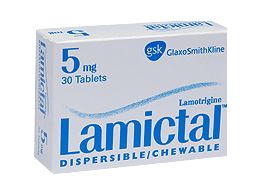
Consumers report that one-in-every-50 Lamictal patients under the age of 16 develop the rare dermatological emergency as a dangerous side effect to the anticonvulsant drug.
Lamictal SJS studies have found that while patients can develop the painful skin condition at any time, it most likely occurs within the first few weeks of taking the medication.
Adults taking the mood stabilizing drug Lamictal report a slightly lower risk of developing SJS as the side effect reportedly occurs in about one-in-every-1,000 cases.
Lamictal SJS Risks
The Food and Drug Administration (FDA) approved Lamictal in 1994 to treat seizures in both adult and children. Since its release on the market, the mood stabilizing drug has also been commonly prescribed to patients diagnosed with bipolar disorder.
Lamictal now carries a FDA black box warning due to the risk of Stevens Johnson Syndrome. The black box warning is the strongest caution the agency will issue before removing the product off the shelves.
Lamictal Stevens Johnson Syndrome is an allergic reaction to the medication. Patients report initial symptoms are flu-like as SJS onset begins with chills, body aches and even a fever.
Lamitcal SJS then turns into a quick spreading red or purple rash that covers the skin and mucous membranes across the body. The Lamitcal SJS lesions will cause the skin to blister and eventually the top layer of skin will die and shed.
The allergic skin rash that covers up to 30 percent of the body is referred to as SJS. However, if the condition spreads beyond that, it is medically known as Toxic Epidermal Necrolysis (TEN).
Both conditions require hospitalization as physicians treat patients in a similar way to burn victims while they try to determine which medication caused the potentially deadly allergic reaction. If Lamictal is suspected to be the cause, doctors will urge patients to permanently avoid the drug.
About 300 new cases of SJS are reported each year. Stevens Johnson Syndrome carries a 15 percent fatality rate, while a TEN diagnosis is deadly in 40 percent of cases.
Lamictal Complications
The anticonvulsant medication known to be an effective treatment for several disorders and has also been linked to other serious Lamictal side effects.
Some of the most commonly reported Lamictal complications include:
- Unusual bruising or bleeding
- Severe fatigue or weakness
- Hives
- Swelling of the lips or tongue
- Swollen lymph glands
- Painful sores in the mouth or around the eyes
- Yellowing of the skin or eyes
- Widespread skin pain
- Severe muscle pain
- Frequent infections
Some patients also report that the mood stabilizing drug Lamictal also causes depression and increased suicidal thoughts in bipolar patients.
Lamictal SJS Lawsuits
Lamictal patients who develop SJS as a side effect to the medication are alleging that drug manufacturer GlaxoSmithKline was aware of the allergic skin reaction linked to the drug but did little to warn consumers or the medical community about it.
In general, Lamictal lawsuits seek financial compensation for the lengthy hospital stays and high medical bills associated with treating SJS or TEN. In addition, patients also seek compensation for the pain and suffering they have endured after developing the rare but painful skin condition.
Do YOU have a legal claim? Fill out the form on this page now for a free, immediate, and confidential case evaluation. The Stevens Johnson Syndrome attorneys who work with Top Class Actions will contact you if you qualify to let you know if an individual lawsuit or class action lawsuit is best for you. [In general, SJS lawsuits are filed individually by each plaintiff and are not class actions.] Hurry — statutes of limitations may apply.
ATTORNEY ADVERTISING
Top Class Actions is a Proud Member of the American Bar Association
LEGAL INFORMATION IS NOT LEGAL ADVICE
Top Class Actions Legal Statement
©2008 – 2024 Top Class Actions® LLC
Various Trademarks held by their respective owners
This website is not intended for viewing or usage by European Union citizens.
Get Help – It’s Free
Help for Victims of Stevens Johnson Syndrome
If you or a loved one were diagnosed with Stevens Johnson Syndrome (SJS) or toxic epidermal necrolysis (TEN) after taking a prescribed or over-the-counter medication, you may be eligible to take legal action against the drug’s manufacturer. Filing an SJS lawsuit or class action lawsuit may help you obtain compensation for medical bills, pain and suffering, and other damages. Obtain a free and confidential review of your case by filling out the form below.
An attorney will contact you if you qualify to discuss the details of your potential case at no charge to you.
Oops! We could not locate your form.












